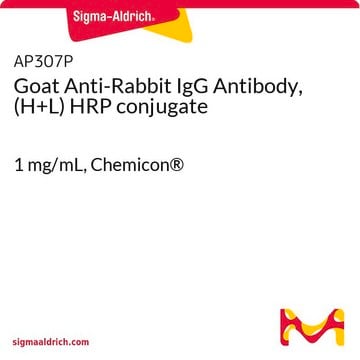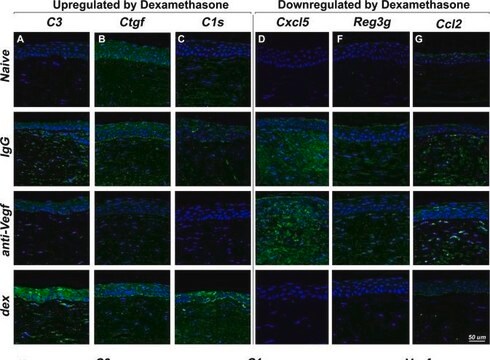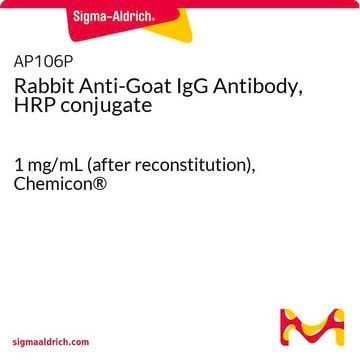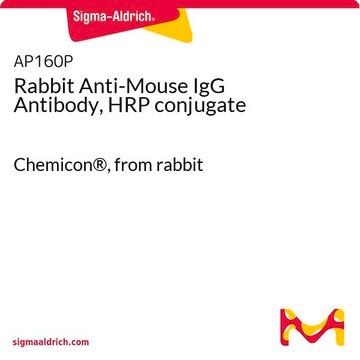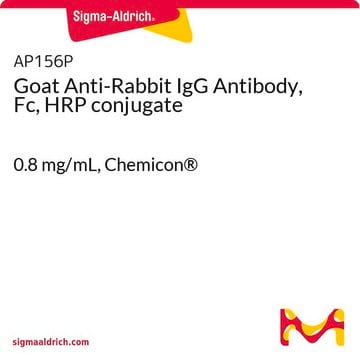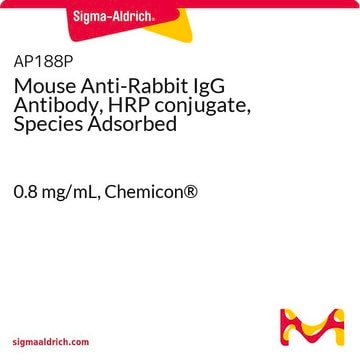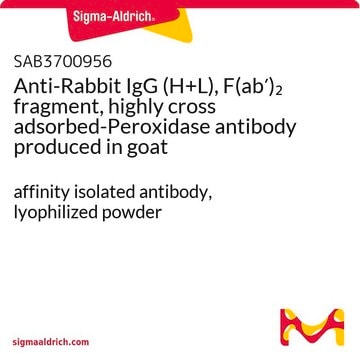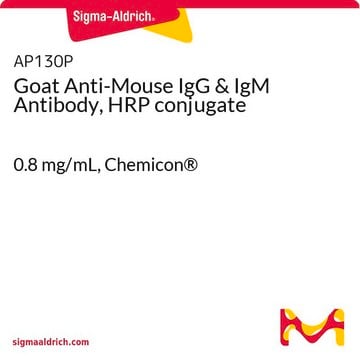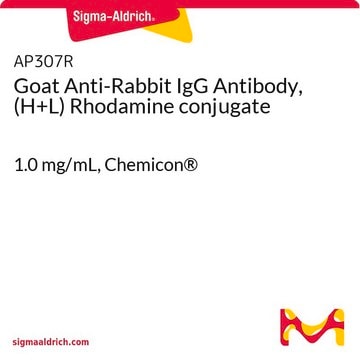12-348
Goat Anti-Rabbit IgG Antibody, HRP-conjugate
1 mg/mL, Upstate®
Synonym(s):
Anti-rabbit IgG
Sign Into View Organizational & Contract Pricing
All Photos(1)
About This Item
UNSPSC Code:
12352203
eCl@ss:
32160702
NACRES:
NA.46
Recommended Products
biological source
goat
Quality Level
conjugate
peroxidase conjugate
antibody form
purified immunoglobulin
antibody product type
secondary antibodies
clone
polyclonal
species reactivity
rabbit
manufacturer/tradename
Upstate®
concentration
1 mg/mL
technique(s)
ELISA: suitable
immunohistochemistry: suitable
western blot: suitable
isotype
IgG
shipped in
dry ice
target post-translational modification
unmodified
Related Categories
General description
Immunoglobulin G (IgG), is one of the most abundant proteins in human serum with normal levels between 8-17 mg/mL in adult blood. IgG is important for our defence against microorganisms and the molecules are produced by B lymphocytes as a part of our adaptive immune response. The IgG molecule has two separate functions; to bind to the pathogen that elicited the response and to recruit other cells and molecules to destroy the antigen. The variability of the IgG pool is generated by somatic recombination and the number of specificities in an individual at a given time point is estimated to be 1011 variants.
Specificity
Specific for rabbit IgG heavy and light chains.
Immunogen
Highly purified whole rabbit IgG.
Application
Goat Anti-Rabbit IgG Antibody, HRP-conjugate detects level of Rabbit IgG & has been published & validated for use in WB, IH, ELISA.
Quality
Evaluated by western blot.
Western Blot Analysis: Suitable for western blotting (dot blot), ELISA and immunohistochemistry. A working dilution of 1:15,000 to 1:60,000 is suggested for ELISA. A working dilution of 1:2,000 to 1:6,000 is suggested for western blotting procedures. A working dilution of 1:500 to 1:3,000 is suggested for immunohistochemistry. Optimal antibody dilution for other applications should be determined by the researcher.
Western Blot Analysis: Suitable for western blotting (dot blot), ELISA and immunohistochemistry. A working dilution of 1:15,000 to 1:60,000 is suggested for ELISA. A working dilution of 1:2,000 to 1:6,000 is suggested for western blotting procedures. A working dilution of 1:500 to 1:3,000 is suggested for immunohistochemistry. Optimal antibody dilution for other applications should be determined by the researcher.
Physical form
Goat polyclonal conjugated with horseradish peroxidase IgG in buffer containing 50% storage buffer 0.02 M potassium phosphate, 0.15 M NaCl, pH 7.2, 10 mg/mL BSA, 0.01% (w/v) gentamicin sulfate and 50% glycerol.
Rehydration: Add 500 µL sterile, distilled water containing 50% glycerol, to make a 1 mg/mL stock solution.
Rehydration: Add 500 µL sterile, distilled water containing 50% glycerol, to make a 1 mg/mL stock solution.
Legal Information
UPSTATE is a registered trademark of Merck KGaA, Darmstadt, Germany
Not finding the right product?
Try our Product Selector Tool.
Storage Class Code
11 - Combustible Solids
WGK
WGK 3
Certificates of Analysis (COA)
Search for Certificates of Analysis (COA) by entering the products Lot/Batch Number. Lot and Batch Numbers can be found on a product’s label following the words ‘Lot’ or ‘Batch’.
Already Own This Product?
Find documentation for the products that you have recently purchased in the Document Library.
Customers Also Viewed
Activation-induced cell death and total Akt content of granulocytes show a biphasic course after low-dose radiation.
Gaipl, U S, et al.
Autoimmunity, 42, 340-342 (2009)
Geovanny I Nic-Can et al.
Methods in molecular biology (Clifton, N.J.), 877, 313-324 (2012-05-23)
Epigenetics includes DNA methylation and histones posttranslational modifications such as methylation, acetylation, phosphorylation among others. One of the most abundant modifications in histone tail is the methylation. It has been found that the methylation pattern in the histone H3 may
Kuo-Sheng Hsu et al.
The Journal of biological chemistry, 288(35), 25375-25386 (2013-07-19)
Cytokine modulation of the endothelium is considered an important contributor to the inflammation response. TNFα is an early response gene during the initiation of inflammation. However, the detailed mechanism by which TNFα induces proinflammatory gene expression is not completely understood.
Sven Kroening et al.
American journal of physiology. Renal physiology, 298(3), F796-F806 (2009-12-25)
Tubular epithelial cells secrete connective tissue growth factor (CTGF, CCN2), which contributes to tubulointerstitial fibrosis. However, the molecular regulation of CTGF in human primary tubular epithelial cells (hPTECs) is not well defined. Therefore, CTGF expression was characterized in hPTECs isolated
Maj Sundbom et al.
BMC pharmacology, 8, 3-3 (2008-02-14)
A substantial body of evidence indicates that reduced plasma adiponectin levels may be key in the development of insulin resistance, type 2 diabetes and the metabolic syndrome. Glucocorticoids decrease the levels of adiponectin in animals and humans. Cortisone is transformed
Our team of scientists has experience in all areas of research including Life Science, Material Science, Chemical Synthesis, Chromatography, Analytical and many others.
Contact Technical Service